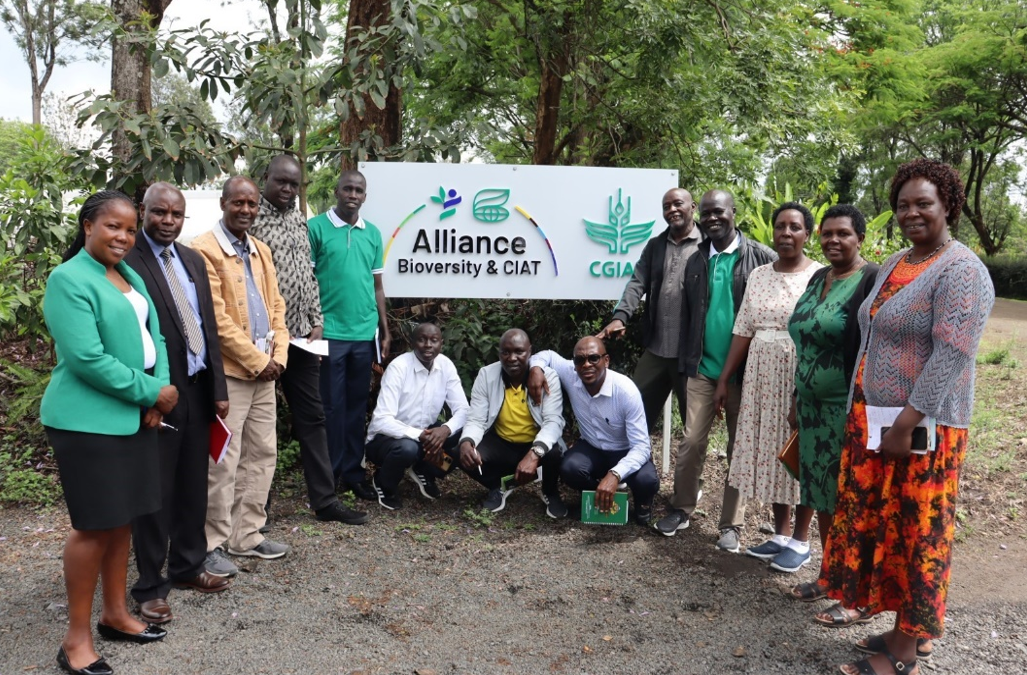By Martin Majambele, Teshale Assefa, Geodfrey Kessy, Nicholaus Kuboja, Silas Nyanda, Lazaro Tango, Rafiq Hamza, Michael Kazyoba & Justus Ochieng
The Alliance of Bioversity International and CIAT hosted delegations from the Zanzibar Agricultural Research Institute (ZARI) and the Committee on Agriculture, Livestock, Fisheries, and Irrigation from Elgeyo/Marakwet County Assembly, Kenya. The visits featured enriching discussions that highlighted the shared commitment to advancing agricultural research and innovation in Tanzania.
The ZARI Delegation visited the CIAT offices on 20 November 2024 and central to the discussions with ZARI was the potential for collaboration in bean breeding, seed systems, and technology transfer, a vital area for improving food security and nutrition in Tanzania. Both teams exchanged insights on the latest advancements in breeding technologies, emphasizing the importance of developing high-yielding, climate-resilient bean varieties and highly nutritious beans tailored to the specific needs of farmers in Zanzibar and beyond.
Capacity building was another key focus, with conversations highlighting the need for skill enhancement among researchers and extension officers. Both institutions expressed a mutual interest in knowledge transfer initiatives, including joint training programs, workshops, and exchange visits, to empower professionals and strengthen agricultural systems.

Picture 1: Representatives from ZARI, TARI Selian centre and the Alliance of Bioversity International & CIAT engaging in productive discussions on collaborative opportunities, including bean breeding and capacity building, during a recent visit to the Alliance offices, Arusha.

Picture 2: Delegates from the Zanzibar Agricultural Research Institute (ZARI) and the Alliance of Bioversity International & CIAT pose for a group photo after fruitful discussions on strengthening collaboration in bean breeding and capacity building initiatives.
CIAT-Tanzania will also provide training to ZARI scientists and technicians on bean field breeding and laboratory service facilities with access to advanced disease diagnostics, nutrition analysis, and biotechnology research. Experience sharing for field bean breeders between the two institutes will enable the harmonization of standard operating procedures, facilitating joint monitoring of breeding programs, updates on newly available methodologies, phenotyping technologies, and resource sharing.
Marker-assisted selection was recognized as crucial for increasing selection accuracy and shortening the breeding cycle, a necessary adaptation to climate change. Genotyping techniques were highlighted for their role in developing improved bean varieties that are fingerprinted and validated for traits of interest, offering higher breeding values and better suitability to environmental challenges and consumer preferences. This ultimately leads to enhanced agricultural productivity and sustainability.
The discussions also explored the possibility of signing a Memorandum of Understanding (MoU) to formalize this partnership. Such an agreement would pave the way for collaborative research, resource sharing, and the development of impactful agricultural solutions.

Picture 3 & 4; The top row shows the three major bean grain types (Market classes) grown in Tanzania mainland; and bean nurseries located at CIAT- Arusha.
The visit concluded with optimism, as both teams affirmed their dedication to working together to address challenges in agriculture. This collaboration has the potential to transform the livelihoods of smallholder farmers, ensuring a more sustainable and food-secure future. This visit marks a promising step forward in agricultural innovation, with the Alliance and ZARI poised to make a significant impact through shared expertise and a unified vision.
In addition, the Alliance welcomed the Committee on Agriculture, Livestock, Fisheries, and Irrigation from Elgeyo/Marakwet County Assembly, Kenya. The delegation, led by the committee chairperson Hon. Jeremiah Kibiwott, engaged in discussions aimed at capacity building and participated in an exchange program with TARI and CIAT on agriculture, seed, and food production.
Hon. Jeremiah Kibiwott remarked, “This visit has been a valuable opportunity for us to learn and share experiences on agricultural innovations that can drive food security and improve the livelihoods of our farmers. By engaging with experts at CIAT and TARI, we have gained insights into advanced seed systems and technologies that we can adapt to meet the unique needs of our communities in Kenya.”

Picture 5: The delegation, in a group photograph with the TARI Selian Centre Leader, Dr. Nicholaus Kuboja (second in the left with black suit) and Dr. Teshale Assefa, CIAT Country Representative (After Dr. Kuboja)
Teshale Assefa, CIAT Country Representative for Tanzania, emphasized the importance of collaboration, stating, “As we move forward, the proposal drafting process will actively involve our partners and policymakers. This approach ensures that the solutions we develop are inclusive, practical, and aligned with the needs and priorities of all stakeholders.”

Picture 5: CIAT Country Representative for Tanzania, Teshale Assefa, explaining on the process of Bean Breeding to the delegation
The two visits demonstrate the power of partnerships in addressing agricultural challenges and highlight the commitment of all parties to fostering innovation, knowledge exchange, and sustainability in agriculture across the region.


